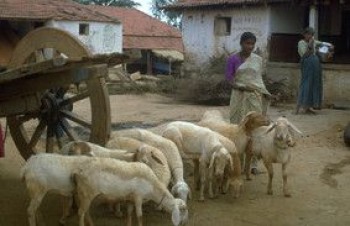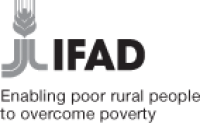Small Indian hill state aims to improve agricultural livelihoods with UN loan.
Small Indian hill state aims to improve agricultural livelihoods with UN loan.
1 February 2012 – India is receiving a loan of nearly $90 million from the United Nations to improve agricultural livelihoods in the small north-western state of Uttarakhand, one of the poorest areas in the country.

IFAD will provide a US$89.9 million loan to India to improve
agricultural livelihoods in the State of Uttarakhand. Photo: IFAD
The money, resulting from an agreement signed today between the Government and the UN International Fund for Agricultural Development (IFAD), will go towards the Integrated Livelihoods Support Project, which aims to support and develop the food production system in Uttarakhand by improving technologies for traditional food crops and livestock.
“This project is a direct response from the Government of India to scale up successful rural development programmes in the state,” IFAD states in a news release.
The project will enable farmers to earn more by selling cash crops, according to the Rome-based agency. Production of off-season vegetables such as potatoes, tomatoes and peas will increase and better marketing arrangements will be put in place.
The project, which will cover 143,000 households, will also introduce new crops and products such as nuts, spices, medicinal and aromatic plants. Among those expected to benefit are small rural producers, women, scheduled caste households and young people.
Although many households in Uttarakhand have land, the holdings are very small and the tiny terraced plots on steep hillsides make mechanization extremely difficult, points out IFAD, the agency that works with rural people to help them break out of poverty.
With this new project, IFAD will have financed 24 programmes and projects in India since 1978 for a total investment of $746 million.
###
US$89.9 million IFAD loan to India for poverty reduction in Uttarakhand State
Rome, 1 February 2012 – The International Fund for Agricultural Development (IFAD) will provide a US$89.9 million loan to the Republic of India to improve agricultural livelihoods in the State of Uttarakhand.
Venu Rajamony, Joint Secretary, Department of Economic Affairs of the Republic of India, and Nigel Brett, IFAD Country Programme Manager for India, today signed the loan agreement in New Delhi for the Integrated Livelihoods Support Project.
Uttarakhand is a small hill state in the north-west part of the country and one of the poorest states in India. Although many households have land, the land holdings are very small and the tiny terraced plots on steep hillsides make mechanization extremely difficult. This project is a direct response from the government of India to scale up successful rural development programmes in the state.
The project will cover 143,000 households, including small rural producers, women, scheduled caste households and young people. At least 50 per cent of beneficiary groups will be female, and 20 per cent of the groups will focus on vulnerable households.
The main focus of the project will be to support and develop the food production system by improving technologies for traditional food crops and livestock. Farmers will be able to earn more by selling cash crops. Production of off-season vegetables such as potatoes, tomatoes, peas will increase and better marketing arrangements will be put in place. The project will also introduce new crops and products such as nuts, spices, medicinal and aromatic plants.
On the occasion of the loan agreement, Venu Rajamony, stated that his government is pleased with the partnership with IFAD. Rajmony recalled IFAD’s role as a committed development partner, with a clear focus on innovative solutions for the most pressing development challenges in some of the remote geographic areas in the country.
Since 1978, with this new programme, IFAD will have financed 24 programmes and projects in India for a total investment of about $ 746 million.
###

The International Fund for Agricultural Development (IFAD), a specialized agency of the United Nations, was established as an international financial institution in 1977 as one of the major outcomes of the 1974 World Food Conference. The Conference was organized in response to the food crises of the early 1970s that primarily affected the Sahelian countries of Africa. The conference resolved that “an International Fund for Agricultural Development should be established immediately to finance agricultural development projects primarily for food production in the developing countries”. One of the most important insights emerging from the conference was that the causes of food insecurity and famine were not so much failures in food production, but structural problems relating to poverty and to the fact that the majority of the developing world’s poor populations were concentrated in rural areas.
IFAD is dedicated to eradicating rural poverty in developing countries. Seventy-five per cent of the world’s poorest people – 1.4 billion women, children and men – live in rural areas and depend on agriculture and related activities for their livelihoods.
Working with rural poor people, governments, donors, non-governmental organizations and many other partners, IFAD focuses on country-specific solutions, which can involve increasing rural poor peoples’ access to financial services, markets, technology, land and other natural resources.
IFAD’s mission is to enable poor rural people to overcome poverty.
* Official website: http://www.ifad.org/
###
> United Nations (UN).
 The United Nations was established on 24 October 1945 by 51 countries committed to preserving peace through international cooperation and collective security. Today, nearly every nation in the world belongs to the UN: membership totals 192 countries.
The United Nations was established on 24 October 1945 by 51 countries committed to preserving peace through international cooperation and collective security. Today, nearly every nation in the world belongs to the UN: membership totals 192 countries.
When States become Members of the United Nations, they agree to accept the obligations of the UN Charter, an international treaty that sets out basic principles of international relations. According to the Charter, the UN has four purposes:
- to maintain international peace and security;
- to develop friendly relations among nations;
- to cooperate in solving international problems and in promoting respect for human rights;
- and to be a centre for harmonizing the actions of nations.
###
* The above story is adapted from materials provided by United Nations (UN)
** More information at United Nations (UN) 



















